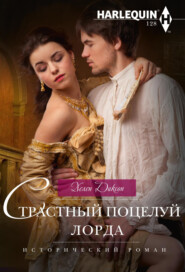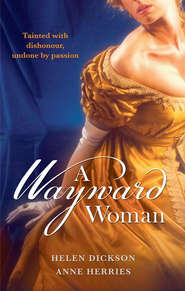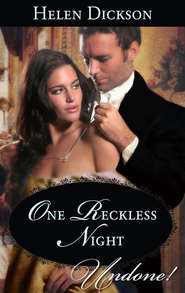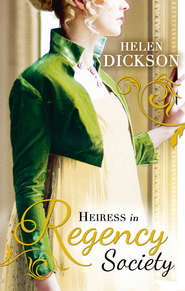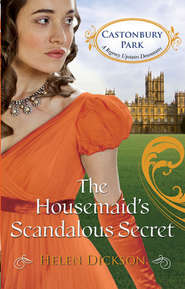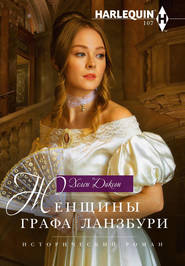По всем вопросам обращайтесь на: info@litportal.ru
(©) 2003-2025.
✖
The Devil Claims a Wife
Настройки чтения
Размер шрифта
Высота строк
Поля
Cedric had seen how Guy had warmed to Jane Lovet, had been aware that his eyes had filled with the soft fire he felt when he’d looked at her. It could be interesting seeing how he dealt with the finer points of luring her into his bed. He had what other men envied. He was well favoured in looks and fortune, and he had any woman he wanted. It was no boast, but the honest truth. Women never turned him down.
Guy was also a fighter without equal, a soldier for whom violence was not indulged, but controlled—whose aggression was directed, not by ambition for personal glory, but by a sense of justice. He was a clear-headed, resourceful planner, a tireless campaigner, an entertaining, cheerful, unpretentious companion and faithfully loyal. But all Guy’s virtues were warrior virtues. He was made for war. He thought of nothing else. He was also an integral part of King Edward’s council, and as such the powerful barons saw him either as a shrewd friend to look to in times of trouble, or as a man to be wary of if they were involved in anything detrimental to the king.
But of late Cedric could see in his friend that he was, at thirty years old and having been brought low by the death of his brother, growing tired of war and that his thoughts were turning to the softer joys of hunting and hawking, of peace and music and love.
Guy rode into the outer bailey, casting an eye over the castle folk waiting to welcome their lord home, nodding in reply to their welcome. There wasn’t a man, woman or child that didn’t know of the black reputation he had acquired in France. He took a moment to look around. The main structure of the castle was built around the inner bailey in whose centre was the well that ensured the water supply. On the ground floor were the Great Hall, the stables, the kitchen and storerooms, and the living quarters communally shared by a large collection of human and animal dependants.
Guy and his men dismounted and handed their horses to the grooms who rushed forwards to take them, servants bowing low when they entered the great hall. The warmth and welcome of Sinnington Castle embraced him, along with the aroma of roasting meat from the kitchen. Guy felt himself relax, all the tensions easing out of him. After years of fighting, the need to be forever alert and watchful was being replaced by a sense of well-being.
Lovet House was a substantial family home. It was a long house, half-brick, half-timber, and commodious with glass in the windows. Its airy halls and parlours were decorated with many tapestries and carpets. Between the house and the river were the well-tended gardens which Margaret Lovet, Jane’s mother, had filled with sweet-scented roses growing on trellises and where peacocks flaunted their beautiful feathers like vainglorious lords.
Margaret, whose greatest pleasure was cosseting, watching over and cherishing her children, was elegant, charming and composed. She had a sweet, lilting voice and a patient smile. She was a perfect lady, one Jane had tried to emulate all her life. She kept the house in perfect order and the servants were devoted to her. She was the lady bountiful of Cherriot Vale and her hospitality to the poor was well known.
On entering the house, Jane sought her out after glancing into the spacious undercroft where her father carried out his work and stored his merchandise and seeing a happy band of silk women doing their needlework or weaving or throwing or twisting threads surrounded by the many bolts of cloth: brocades from Milan, Venetian velvets, the finest manufactured silk from Lucca—Italian silk being of supreme quality and a significant source of trade. Jane liked nothing better than fingering these sumptuous fabrics, hopefully destined for the wealthy when her father’s business picked up, as it surely would when she married Richard.
She found her mother in the parlour. She had opened the windows that overlooked the river shifting endlessly by. Her head beneath her tall headdress was bent over her work as she put the finishing touches to the dress Jane was to wear for her betrothal, her face still and serene as she embroidered her thoughts into the gown.
Looking up from her work when Jane entered the room, Margaret curved her lips in a smile of welcome. ‘Ah, Jane! I’m glad you’re back, although I do wish you had been home earlier. John Aniston called on us this afternoon.’
‘Did he? For what reason?’
‘Richard has to leave for Italy sooner than planned, so, as soon you are betrothed, the wedding will have to be brought forwards.’
Jane’s heart sank. That Richard was leaving for the commercial metropolis of Florence with a group of cloth merchants had been planned for weeks now. ‘I see. How soon?’
‘No more than two weeks after the betrothal.’
Jane stared at her mother in disbelief, panic taking hold of her. ‘You can’t mean that. The wedding is set for six weeks after the betrothal. There is so much to do. It is too soon. We cannot possibly be ready in time.’
‘We have to be,’ Margaret said, resuming her sewing. ‘Richard wants to see you settled in his father’s house before he leaves. With you and Kate to help me we can be ready with time to spare.’ Looking up, she noted her daughter’s pale face and sensed her unease. ‘Jane, you do want to marry Richard, don’t you? You know I love you and I would understand if you are against this marriage—but …’
‘I don’t think Father would be so understanding,’ Jane said when her mother’s voice tapered off. ‘Where he is concerned, my opinion counts for nothing.’
Neither, she thought, did her mother’s. Her father had not always treated his wife kindly and Jane could not remember him asking her mother’s opinion on anything. Docile and submissive, she was not a wilful woman and survived quite well. Unlike everyone else in the household, Andrew had not been afraid of his father. He had believed he knew his tempers, having been on the receiving end of his blows many times. Their father had expected Andrew to dutifully follow him into the business, but Andrew, with his sights firmly set on a military career, had had no such ambitions.
Their father had been furious when Andrew had shown support for the Lancastrian cause and went off to fight. Indeed, wild-eyed and monstrous, he had shouted curses that had rung to the rafters. Jane always squeezed her eyes tight shut at the memory, wishing to banish it from her mind, but could not.
Her father’s greatest fear was loss of status and, it seemed, when confronted with that possibility he lost all reason. Despite Jane’s sympathy for him, she could not bring herself to justify his treatment. She did not care if he was a man mad with disappointment and resentment or the master of the house and her person. There was no claim he could make great enough to make this right.
‘Your father is only doing what he thinks is best for you,’ her mother said in his defence. ‘You have to marry as your circumstances demand. And Richard does want to marry you so much.’ Sighing despondently, she shook her head and went on, ‘Circumstances have been—difficult of late. Indeed, as you are aware, the business has suffered very badly.’
Jane knew this was true. No one could do business in a town without belonging to or having the respect of the other members of the guild. Her father’s business and his standing among the other guild members had suffered greatly because of Andrew’s support for King Henry. They all felt the humiliation of his reduced status and it was like balm to her parents’ wounds to have their daughter marrying the son of an important and respected alderman of the guild.
‘Far more devastating to your father’s pride was the knowledge that you would have to share the grim consequences of his misfortune,’ her mother went on in an attempt to justify her husband’s strict treatment of his eldest daughter. ‘Everyone would realise that you would not have the great dowry formerly anticipated and the most worthy of the men seeking wives, those best able to provide the standing and security you deserve, would turn their attention elsewhere. Which is why arranging this alliance is just as important to your father as winning a battle. Marriage to Richard is a way in which John Aniston intends to honour him with such an important connection. Your father is hopeful of calming the temper of the guild and redeeming both his status and the respect he rightly deserves. Perhaps then the business will prosper once more.’
Jane took a deep, tight breath. That she was being sacrificed for her father’s ambition went against the grain, but this she kept to herself. All her life she had hoped she would have the freedom to choose her own husband, but, when it came to it, her father had chosen for her. A good alliance, he called it—but the last person she’d ever have chosen would be Richard. How she wished she could look upon him more favourably. It would be so much easier to welcome this marriage, but he was not her idea of an ideal husband—or lover.
Averting her eyes, she was unable to ignore the picture that entered her mind of the last time she had seen Richard when he had come to dinner with his parents and other guild members, when her father had put on a lavish meal in an attempt to impress the aldermen. Jane did not think she would ever grow to love Richard, not as a woman should love her husband. Would she be able to pretend to do more than endure? When she looked into his eyes she did not see love, comfort, laughter or companionship—in fact, when he had leered at her obscenely and tried to grab her knee under the table, it seemed his thin veneer of courtesy was easily dissolved by brandy wine.
Richard was the eldest son of John Aniston, who could refuse his son nothing. With his second son to run his cloth business, Richard had been free to follow his dream and became a squire in a nobleman’s household in Wiltshire, and later doing military service on the field of battle where his skill and bravery brought him acclamation from his superiors. It was his ambition to become a knight—but not all squires became knights.
There had been some kind of trouble at his master’s house. The true facts were not known, but Richard’s involvement was suspected and he had been dismissed. As a consequence, under great sufferance, Richard had returned home and joined his father and brother in the business. But the manufacture of cloth held no appeal for Richard and his life’s ambition, to become a knight, to ride, hunt, fence and fight in battle, was in no way diminished.
When Richard’s father had offered a sizeable stipend to be paid for Jane’s hand in marriage to his son, assuring Jane’s father that Richard’s dismissal from his master’s house was a trivial matter and nothing more than a young man’s exuberance, Simon Lovet had considered it a good match and seen no reason why Richard should not be considered as a suitor for Jane.
When he told his daughter of his decision, Jane knew she would have to give up all hope of marrying someone she loved in order to save the family. Her stomach twisted into sick knots at the thought of committing her body, her entire life, into the hands of a man she instinctively recoiled from, but, miserably resigned to her fate, she lifted her head and bravely met her mother’s gaze.
‘Please don’t worry, Mother. Everything will work out for the best, and this painful time will soon be forgotten. Of course I will marry Richard. It is already decided,’ she said, telling herself that the look of pride and relief on her mother’s face made the sacrifice worthwhile.
Chapter Two
It was the following day when Jane found herself alone with Richard. He had ridden over with his father. His stubborn beard was subdued with oil, his crinkled red hair smoothed down and close cut, which gave him an aggressive look. His clothing and accessories were stylish and well made of only the finest cloth.
Jane raised her eyes to his heavy-featured face. Tall and of stocky build, he wasn’t unattractive, in a coarse way. Surly and argumentative, he had a belligerent nature which simmered away beneath the surface. He was always in trouble for slovenliness, laziness and greed. The despair of his parents, he was without self-control, and it was his father’s hope that marriage to Jane was a way of getting someone else to enforce the restraint he could not impose himself.
Richard was delighted to be marrying Jane and to sit next to her at the dining table. He could stare at her while he ate, at her breasts, and every time she leaned forwards he could peek down the square neckline of her dress. His blood ran hot when he thought of the time not far away when he would command her to take off her clothes and stand naked before him, and he could look at her breasts and fondle them in their magnificent entirety.
When he suggested they take a walk, Jane was hoping her father would refuse his permission, but to her disappointment he obliged most readily.
Before Jane could utter any protestations, with the shadow of a sly grin upon his face and carrying himself with an air of arrogant self-assurance, Richard had taken her hand and drawn her outside. In no time at all they had left the house behind. He told her how happy he was that the wedding had been brought forwards and that he was looking forward to their betrothal party, seemingly unaware of how quiet she was.
Richard talked of his trip to Italy and how she would be cared for in his father’s house. When he returned they would have their own house and he would start up his own enterprise—perhaps one day take over his father’s.
The sun was hot and much as Jane would have liked to withdraw her hand from his nauseatingly soft, damp grasp, she endured it—as she would have to endure many intimacies in the days ahead. They were walking along a well-worn path in the forest, and when they were no longer within sight of the village Richard stopped and turned to her.
Uncertain about what was to happen, Jane looked at him, suddenly nervous of him and the solitude of the woods. ‘I think we have walked far enough, Richard. We should go back.’
‘Nay, not yet, not when I have you to myself at last.’
He stared at her with impudent admiration, letting his gaze travel from her eyes to her mouth, then down to the pale swell of her breasts. Instinctively she lifted her shawl to cover her bare neck and shoulders, aware that her cheeks had grown hot beneath his lecherous scrutiny.
He laughed softly. ‘You are a witch, Jane, for have you not cast a spell on me so I can think of nothing else but you? Will you kiss me, to demonstrate your affection for your future husband?’
Feeling the heat of his close proximity, she stepped back. ‘This is neither the time nor the place to take such liberties. Let us go back to the house,’ she pleaded with quiet desperation.
At first Richard was disappointed by her reaction, but then, not to be deterred, he grinned. ‘Oh, such a proud one,’ he murmured, allowing his fingers to brush her cheek, annoyed when she flinched at his touch. ‘And such a beauty … such a beauty. Don’t fight me. There’s nothing to fear.’ He reached out to slip the shawl from her shoulders.
‘No, Richard,’ she retorted, holding on to it with grim determination.
‘It isn’t right to tease a man that way, Jane.’
‘I don’t mean to tease you.’
His eyes darkened. ‘Happen you didn’t. You don’t know the power behind the promise in your eyes. God knows you’re a woman to tempt a man to lose his reason. I want you. You drive me to madness with your wanton beauty.’
‘Wanton? Is that what you think?’ Her pale cheeks instantly flushed scarlet as June poppies with shame. ‘Your impatience does not do you justice, Richard. You must not pre-empt our marriage vows. You must respect my wishes and wait until we are wed.’
Reaching out, he held the point of her chin and made her look at him. ‘Don’t look so worried. I won’t hurt you. There’s nothing to fear. If we go further into the wood, no one will come upon us.’






